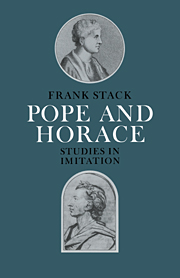Book contents
- Frontmatter
- Contents
- Acknowledgements
- List of abbreviations
- Preface
- PART I INTRODUCTIONS
- PART II THREE HORATIAN SATIRES (1733–4)
- PART III MATURE HORACE (1736–7)
- 6 Lyric vision: The Imitations of Odes IV.i. and IV.ix.
- 7 The Horatian epistle: The Imitation of Epistle II.ii.
- 8 Poetry and politics: The Imitation of Epistle II.i. (‘To Augustus’)
- PART IV THE TIME OF TENSION (1738)
- Epilogue
- Appendix: Imitations of Horace published 1730–40
- Notes
- Bibliography
- Index
8 - Poetry and politics: The Imitation of Epistle II.i. (‘To Augustus’)
Published online by Cambridge University Press: 08 January 2010
- Frontmatter
- Contents
- Acknowledgements
- List of abbreviations
- Preface
- PART I INTRODUCTIONS
- PART II THREE HORATIAN SATIRES (1733–4)
- PART III MATURE HORACE (1736–7)
- 6 Lyric vision: The Imitations of Odes IV.i. and IV.ix.
- 7 The Horatian epistle: The Imitation of Epistle II.ii.
- 8 Poetry and politics: The Imitation of Epistle II.i. (‘To Augustus’)
- PART IV THE TIME OF TENSION (1738)
- Epilogue
- Appendix: Imitations of Horace published 1730–40
- Notes
- Bibliography
- Index
Summary
I am as you guess'd, returned from one Journey, & now I must add I am going on another: But to the quietest place I can go to, where I never yet pass'd a fortnight, but by a fatality, I think, I fall to writing verses. I wrote there my last Epistle; & began an Imitation of the finest in Horace this spring; which I propose to finish there this autumn. I mean Lord Peterborow's at Southampton, where I am to put the last hand too to the Garden he begun, & lived not to finish. It is a place that always made me Contemplative, & now Melancholy; but tis a Melancholy of that sort which becomes a Rational Creature, & an Immortal Soul.
Pope to Fortescue, 21 September 1736The poem Pope was hoping to finish at Southampton in the autumn of 1736 was almost certainly his Imitation of Epistle II.i., Horace's most elaborate and most eloquent discussion of the nature of Augustan poetry and of the role of the poet in society. It is clear that Pope took great pains with this Imitation: his ‘Advertisement’ suggests a fresh and stimulating reading of Horace's poem, his Imitation has an impressive inner unity which is imaginatively modelled on that aspect of Horace's poem, and Pope's language possesses throughout its own subtle eloquence. If the Horatian epistle is ‘the finest in Horace’ Pope's Imitation of it is, unquestionably, the climax of his engagement with the mature Horace.
In interpreting and evaluating this Imitation I want to stress the richness of Pope's response to the whole of this Horatian epistle. Comparison with the Imitation of Epistle II.ii. here underlines the point.
- Type
- Chapter
- Information
- Pope and HoraceStudies in Imitation, pp. 150 - 198Publisher: Cambridge University PressPrint publication year: 1985

